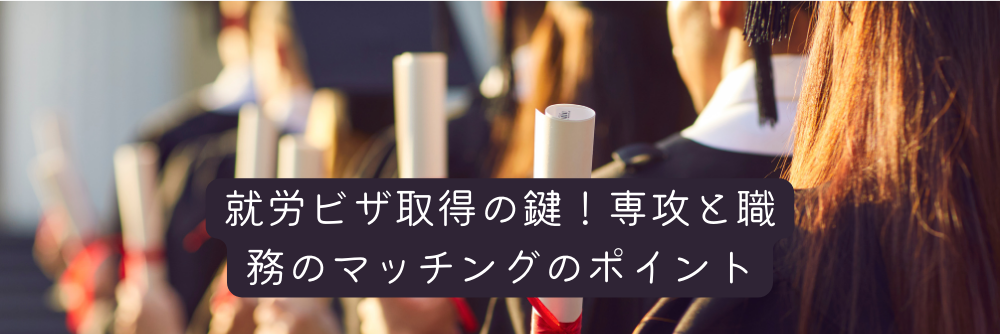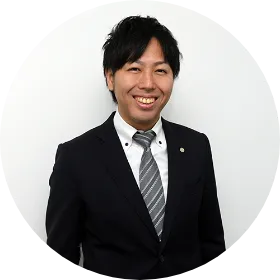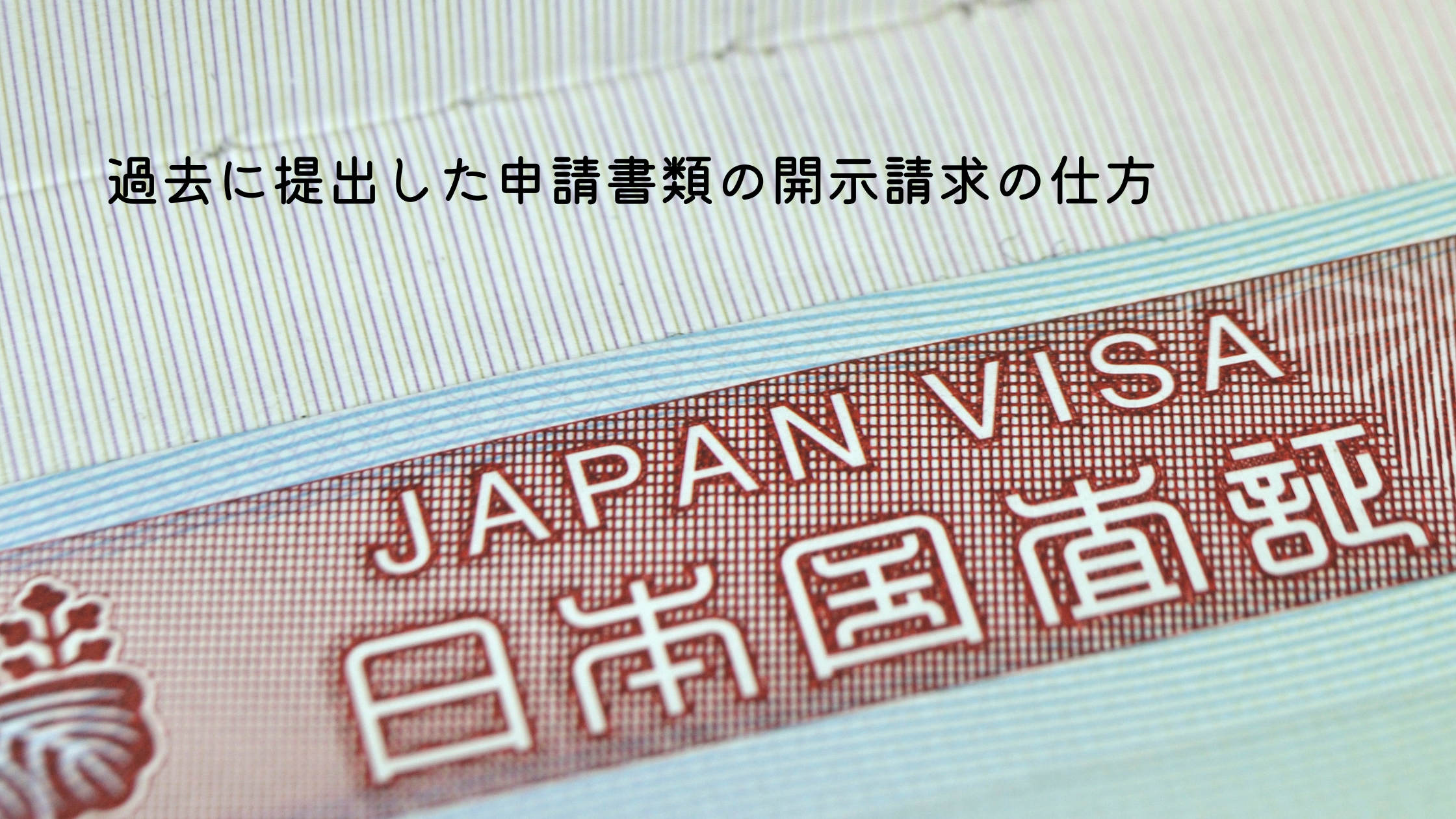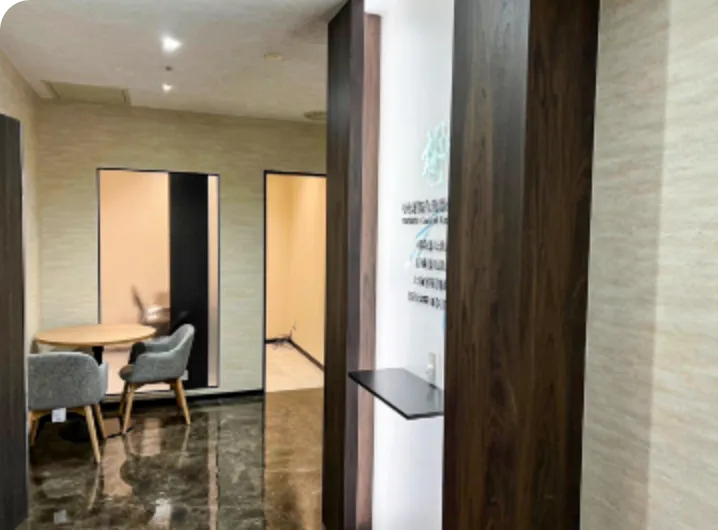Work Visa
Keys to Obtaining a Work Visa! Key to Matching Major and Job
- 2024.05.10

If any of the following apply to you, please read this explanation. ☑I graduated from a vocational school and want to get a work visa to work in Japan, will that be difficult? ☑I applied for a change to a work visa or certification by myself but was denied. ☑I want to change jobs but don't know what to do with my visa. ☑We are hiring a new foreign employee and were asked for visa support. We don't have anyone in our company with the experience. ☑I have been on overseas business trips for a long period because of my job, but I want to renew my work visa.
- What is a work visa?
- Works that can be done with a work visa
- Three Perspectives on Work Visa Approval
- Relevance of the job description to the major of the last education
- Standard evaluation time
- Other work visas
- Frequently asked questions about work visas
- Support and fees for “Engineering/Humanities/International Services” visa
- For Employers and HR Professionals
What is a work visa?
In order to work in Japan and engage in remunerative activities in Japan, it is necessary to obtain a visa/resident status that allows you to work.
The common name for this type of visa for the purpose of working is generally called a “work visa”.
In other words, there is no “work visa” visa to work in Japan, but rather various statuses of residence tailored to the nature of the work you are working for. (Engineering/Humanities/International Services, Engineering, Business Management, Intra-company Transferee, Entertainer, Professor, Arts, Religion, Press, Legal/Accounting Services, Medical, Research, Education)
The relevance of what you have studied before college to your profession and, in the case of a professional occupation, your previous career history, etc. are also important.
For a detailed explanation of the screening procedure, please visit work visa!
Works that can be done with a work visa
There are more than 10 types of work visas in total, depending on the nature of the work. Here we describe the work visas most frequently obtained by foreigners and the jobs that can be performed with the residence status “Engineer/Humanities/International Services,” which is said to be representative of the work visas.
As separated by “Engineering,” “Humanities,” and “international services,” each has the following meanings.
- “Engineering”… Activities that involve work in science.
- “Humanities”…Activities that involve work in the Humanities.
- “International Services”…Activities that require the unique characteristics and sensitivities of foreign nationals.
Examples of activities included in the”Humanities” classification
The term “Humanities” refers to the fields of law, economics, sociology, and other Humanities.
The following occupations are available in the category of Humanities
Example.)
- Sales
- Planning
- Public Relations
- Consulting
- Marketing
- Accounting, Human Resources, General Affairs, Legal
In addition to the above, many other jobs fit the “Humanities” category!
If you are unsure whether your work fits in the “Engineering/Humanities/International Services” classification, please feel free to contact us.
Examples of activities included in the “Engineering” classification
“Engineering” refers to jobs that make use of specialized knowledge in the sciences, and includes engineering and science at universities and other educational institutions, as well as natural science fields such as information Engineering and agriculture.
The following occupations are available in the Engineering category
- Computer-related engineer
Examples: mechanical engineering, electronic engineering, software development, system engineering at a software development company, system engineering at an electrical product manufacturing company, etc.
Information Engineering-related jobs
Examples: data analysis, database administration, financial analysis, network engineering, etc.
- Energy development-related jobs
Example: Work related to the development of renewable energies such as solar, wind, biomass, and, geothermal power generation, also hydrogen energy, etc.
- Other people involved in manufacturing and development
Examples: Food research, quality control, material design, material testing, pharmaceuticals, chemical industry, R&D, analysis and structural design in civil engineering and construction, game development, R&D in industrial research laboratories, etc.
Examples of activities included in the “International Service” classification
The term “international service” means “work that requires thinking or sensitivity based on foreign culture,” or work that makes use of sensitivities unique to foreigners that ordinary Japanese people do not have.
The following are some of the positions available in the international services category
Example.)
- Translation
- Interpretation
- Trade
- Foreign Language Instruction
- Design
- Public Relations
Three Perspectives on Work Visa Approval
Various work-related residence statuses have different requirements, this section will focus on the most common type of work status, the “Engineering/Humanities/International Services Visa”.
The decision to grant a work visa is made from three perspectives: “applicability of residence status,” “landing permission criteria,” and “reasonableness”.
Residence status Applicability: This is a criterion to determine under which specific residence status a foreigner will engage in activities in Japan. In other words, it confirms whether the planned activity meets the residence status under Japanese law.
Landing Permit Criteria: This evaluates whether the conditions associated with a particular residence status are met. For example, it verifies whether the activities the foreigner plans to engage in in Japan meet the conditions of the residence status stipulated by law.
Reasonableness: This is the criterion for evaluating whether there are “reasonable grounds to believe that it is appropriate for the applicant to stay in Japan. Specifically, the stability, continuity, necessity, and credibility of the applicant are considered.
These three factors will be evaluated comprehensively, and only then will be the final decision on whether a work visa will be granted. Simply put, a work visa is granted to a foreigner if his/her activities are appropriate, stable, and necessary.
For a detailed explanation of the screening procedure, please visit work visa !
Relevance of the job description to the major of the last education
To obtain the residence status “Engineering/Humanities/International Services,” being considered the typical work visa, it is necessary to fulfill the educational background requirement. In addition, what you majored in and studied at school (your last school) and whether or not it is relevant to the nature of your work at your place of employment are important points.
This section is divided into (1) “educational background” and (2) “job-related educational background (major)”.
(1) Education requirement (or work experience)
Generally, work visas are only granted to foreigners with advanced knowledge and skills,
To get approval, the applicant must prove that he/she has the appropriate knowledge and skills.
The appropriate knowledge and skills here can be specifically described as follows
Graduated from a university in Japan or abroad, a vocational school in Japan, or an educational institution equivalent to or higher than a university (with appropriate knowledge).
Special exception] At least 10 years of work experience (commensurate skills) related to the position in which you intend to work.
For more information on education requirements, please visit work visa!
(2) Educational background relevant to the job
Please note that not everyone can obtain a work visa as long as they have graduated from a university (including the equivalent of a college or university), and the treatment differs depending on the type of school you graduated from.
(2)-1 For college or university graduates
If you are a college or junior college graduate, they will judge you relatively loosely on the relevance of your major to your work.
|
School Education Law Article 83 “The purpose of the University, as a center of learning, is to impart knowledge broadly, to teach and research deeply specialized arts and sciences, and to develop intellectual, moral, and applied abilities.” |
|
Clarification of “Engineering/Humanities/International Services” residence status, etc. (Immigration Bureau) … (excerpts) … The purpose of the University, as a center of learning, is to impart knowledge broadly, to teach and research deeply specialized arts and sciences, and to develop intellectual, moral, and applied abilities, as well as conducting education and research to realize such purposes and providing the results of such research to society at large (Article 83, Paragraphs 1 and 2 of the School Education Law). In light of the nature of a university as an educational institution, the relevance of a major subject at a university to the work to be engaged in has been judged more flexibly than in the past (judgments at overseas universities are also made in a similar manner). |
As the Immigration Bureau’s view above suggests, if you acquire a broad education in college, the connection between your college major and the work you do at your main employer will be judged relatively loosely.
Even science majors can be granted residence status for Humanities jobs such as clerical work, translation, and overseas sales, and vice versa, it may be possible for Humanities majors to work in the sciences.
However, this is not the case for positions that require a high degree of specialization.
For example, if you graduated in sociology (Humanities) and will have difficulty engaging in research and development of pharmaceuticals, mechanical design, circuit design, etc. without a systematic course of study, you will likely not be approved unless you can prove that you have the background to engage in such work.
◆Admissible cases in which the work differs from the university major (excerpts)
|
Faculty, Department, Major |
Contents of the Work |
|---|---|
|
Business Administration (Graduate School) *Universities in the home country |
In shipping companies, In addition to chartering and operating foreign vessels, providing training and guidance to employees, and other duties. |
|
Business Administration (Undergrad) *Universities in the home country |
In a Japanese company importing and selling foodstuffs and sundries, etc., engaged in interpretation and translation services for business transactions with the home country |
|
Economics, International Relations (Undergrad)
*Universities in the home country |
In a Japanese automobile manufacturer, marketing support services between the home country and Japan, such as conducting research on markets, users, and automobile import trends, managing automobile sales and supply, and strengthening cooperation with local dealers. |
|
Business Administration (Undergrad) *Universities in Japan |
In a company engaged in computer-related services, engaged in work related to translation and interpretation |
|
In a software development company, works as a systems engineer |
|
|
In Japanese airlines, As a cabin attendant on international flights, in addition to emergency response and security duties, provide interpretation and guidance to passengers in their native language, English, and Japanese, and provide language instruction at employee training programs, etc. |
|
|
Faculty of Engineering (University) *Universities in Japan |
In a food company, engaged in consulting services |
|
International Relations (Graduate school) *Universities in Japan |
In an airline, Airport Passenger Services and help boarding with Language Skills Negotiations and tie-up operations with foreign airlines |
(2)-2 For graduates of vocational schools
Unlike universities, if the last education is from a vocational school (professional degree), the job relevance of the school major to the job at the place of employment will be strictly checked.
|
School Education Law Article 124 The purpose is to cultivate the abilities necessary for occupational or practical life or to improve the education of the students. |
|
Clarification of “Engineering/Humanities/International Services” residence status, etc. (Immigration Bureau) … (excerpts) … Since the purpose is to cultivate the abilities necessary for occupational or practical life or to improve the education of the students (Article 124 of the same law), there must be a considerable relationship between the major subjects at a special training college and the work in which the student intends to engage. However, even in cases where the student is not considered to have directly “majored” in the subject but the student is considered to have acquired knowledge related to the work in which he/she intends to engage, the decision on whether to permit the student to engage in the work will be made after a comprehensive evaluation of the entire content of the course. In addition, for those who have been engaged in the relevant work for about three years, the relevance of the current work to the work in which they intend to engage in the future is judged flexibly. |
First, let’s look at the permitted and non-permitted cases.
(Source: Immigration Bureau – Clarification of residence status for “Engineering/Humanities/International Services”, etc. https://www.moj.go.jp/isa/content/001343664.pdf )
◆Cases in which the relevance between the faculty/department and the nature of the work is recognized (excerpts)
*Basically, you must engage in work related to your major based on a contract with a company in Japan that engages in business related to your major.
|
Faculty, Department, Major |
Duties |
|---|---|
|
Department of Translation and Interpretation (Vocational School)
Those who have taken Introduction to Interpreting, Linguistics, Interpreting Practice, Interpreting Practice, Translation Techniques, etc. as major subjects. |
Translation of publications at a publishing company
(Translation and interpretation services) |
|
Department of International Business (Vocational School)
Those who have taken courses specialized in translation and interpretation such as Business Interpreting Practice, Business Translation Practice, and Interpreting Techniques in their specialized courses. |
Interpretation for business meetings and translation of contract documents in the overseas division of a trading company
(Translation and interpretation services) |
|
Department of International Liberal Studies (Vocational School)
70 graduation credits + At least 30 credits in business administration, economics, accounting, etc., as well as Japanese, English, business writing, business communication, and other written expressions. + Passed JLPT N1 |
Interpretation services for international coordination
(Translation and interpretation services) |
|
Manga and Animation Department (Vocational School)
Those who have taken subjects such as game theory, computer graphics, programming, etc. in specialized courses.
|
Game Development Operations |
|
Department of Electrical Engineering (Vocational School)
|
Preparation of construction drawings, Duties such as directing and supervising on-site craftsmen |
|
Department of Architectural Interior Design (Vocational School) |
Construction cost estimation
|
|
Automobile Maintenance Department (Vocational School) |
Engaged in inspection, maintenance, disassembly, etc. of engines, brakes, and other key parts of automobiles as a service engineer, and works as an automobile inspector. |
|
International IT Department (Vocational School) |
Website construction, and Work such as system construction by programming |
|
Cosmetology Department (Vocational School) |
Product development and marketing services related to beauty products through activities as a beauty advisor |
|
Department of Game Creator (Vocational School)
Those who have taken courses in 3DCG, game research, planning presentation, game scenario, production management, creator research, etc. |
As a game planner, I am responsible for the development of games for the overseas market. Customer support services for game apps |
|
Department of Robotics and Mechanics (Vocational School)
Those who have taken CAD practice, industrial mathematics, mechanics of materials, electronic circuits, microcomputer control, etc. |
Checking parts drawings, checking accuracy, creating programs for machining equipment, etc. in a machining department. |
|
Department of Information Systems Development (Vocational School)
Those who have completed business applications, network Engineering, etc. |
Programming of fieldwork systems. Network construction works |
|
Department of International Communication (Vocational School)
Those who have completed communication skills, hospitality training, cross-cultural communication, career design, tourism service theory, etc. |
Training of foreign staff in hospitality, administration and other management tasks |
|
Department of International Business (Vocational School)
Those who have taken Introduction to Tourism, Hotel Seminar, Food and Beverage Practice, Food Service Theory, Retail Marketing, Bookkeeping, Business Manners, etc. |
Recruitment and training of part-time staff, and preparation of materials for new employees at the head office’s business development room of a restaurant management company. |
|
Department of Tourism and Leisure Services (Vocational School)
Those who have taken courses in tourism geography, travel business, sales marketing, presentation, hospitality theory, etc. |
Hired for a career-track position at a large resort hotel + Translation and interpretation services at the front desk, reservation management, concierge services in the lobby, customer satisfaction analysis, etc. |
|
Department of Robotics and Mechanics of Engineering Specialization (Vocational School)
Basic drafting, CAD practice, industrial mathematics Those who have taken courses in science, mechanics of materials, electronic circuits, product design, etc. |
Adjustment of machine accuracy, programming of machining equipment, selection of machining tools, assembly of machine tools, etc.
|
◆Cases in which the relationship between the faculty/department and the nature of the work is not recognized (excerpts)
*Please click here to see examples of disallowances other than the relevance of the major subject and the nature of the work.
|
Faculty, Department, Major |
Contents of the work |
Reason for non-approval (Not considered job-related) |
|---|---|---|
|
Department of Animation (Vocational School) |
Assistance work such as coloring background pictures at an animation production company |
Without proactive creative activity |
|
Department of Design (Vocational School) |
Exclusively customer service and sales duties in the stores of a company engaged in the clothing business |
There is no connection between the major and duties. |
|
Cutting and sewing without independent creative activity |
Production process without independent creative activity |
|
|
Department of Aesthetics (Vocational School) |
Engage in business as a beautician or manicurist |
*Although job-related, it is not possible for a foreigner to obtain a visa for Engineering, Humanities, or international service as a beautician or manicurist. If you are in a National Strategic Special Zone and meet the requirements for a “Designated Activities” visa through the Foreign Hairdresser Training Program, you may be eligible for a Designated Activities visa. |
|
Business Administration (Vocational School) |
Cooking and customer service (hall) |
There is no connection between specialty and duties. Additionally, foreign nationals cannot engage in such work with the residence status of “Engineer/Humanities/International Services”. |
|
CAD/IT Department (Vocational School)
CAD, computer languages, information Those who have taken Introduction to Information Processing, etc., and Japanese language courses (about 20% of graduation credits) in general subjects. |
Translation and interpretation services |
The Japanese language classes in the general courses are designed to improve the basic Japanese language skills of international students and cannot be considered a major in the advanced Japanese language required for interpretation and translation work. |
|
Department of International Business (Vocational School)
The Japanese language in the department was Japanese conversation, reading comprehension, listening comprehension, and Kanji (Chinese characters). Those that are only at the level of improving basic Japanese language skills, such as |
Translation and interpretation services |
Cannot be said to have majored in the advanced level of Japanese required for interpretation and translation work. |
|
Interpreting and Translation College
Those who have completed Japanese-English Interpreting Practice |
Interpretation and translation of manuals for part-time foreign students at a building cleaning company
(Translation and interpretation services) |
Foreign student part-timers usually have a certain level of Japanese language proficiency, so there is no need for interpreters. + Translation of manuals is not a task that occurs constantly, and the volume of work for translation is not recognized. |
|
Translation and Interpretation College
Those who have completed Japanese-English Interpreting Practice |
Taking orders in English at a restaurant where you are working (interpreter) + Translation of menus (translation)
(Translation and interpretation services) |
The interpretation service is limited to simple interpretation as part of customer service. + The volume of work is not allowed for such translation work as it is only a translation of menus. |
|
Department of Japanese Language and Culture (Vocational School)
|
Merchandise sorting operations + Interpret instructions and reminders to part-time workers
(Translation and interpretation services) |
The workload of interpretation for part-time workers sorting merchandise is not acceptable.
|
Standard evaluation time
The standard evaluation time for an Engineering/Humanities/International Services visa is approximately 30-60 days.
This is just an estimation, and the evaluation time will vary depending on the applicant’s application, the circumstances, and the congestion at the Immigration Bureau/Immigration Office’s application desk.
Other work visas
In this issue, we have introduced the “Engineering/Humanities/International Services” residence status, which is the most commonly obtained work-related status for foreigners working for companies in Japan.
Other than that,
There are a total of 6 types of work authorizations that de not require the applicant to meet landing permission criteria (diplomatic, official, professors, arts, religious, and press).
There are a total of 13 types of work qualifications that require landing permission standards: (advanced professional, business administration, legal and accounting services, medical care, research, education, Engineering/Humanities/International Services, intra-company transfers, nursing care, entertainment, skills, specific skills, and Engineering training).
There are a total of 19 types of visas listed above, and if you fulfill the requirements for one of them, you can stay in Japan. (For more details, please refer to this column.)
Frequently asked questions about work visas
Q. Can I get a visa for interpreting work even if I graduated from a technical college?
A. The specialization acquired in a vocational school must be relevant to the job’s nature, so it’s important to note that in some cases, the content studied may not be recognized as eligible for obtaining a visa as an “interpreter.”
Q. Can a Japanese language school graduate obtain a work visa? (
A. Yes, if you meet the requirements.
Even if you graduated from a Japanese language school in Japan, if you “actually graduated from a university (or university equivalent) in your home country” or “have at least 10 years of related work experience,” you may be eligible for an Engineering/Humanities/International Services visa.
In the case of working in the international business category, “at least three years of related work experience” is sufficient. If you majored in a subject related to the work at school, the period during which you majored is also included in the work experience.
Support and fees for “Engineering/Humanities/International Services” visa
When applying for or renewing a work visa, it is often difficult to understand and manage the entire application process and schedule, such as the contents and preparation of documents, what to do and how much and when to do it, and some preparations can be made and results that can be obtained only by professionals. As professional experts in visa and naturalization applications, we can solve those problems and provide support that can provide the preparation and the results that can be obtained only by experts. Here we would like to inform you about our support and fees. In addition, we offer free consultations (for the first time only) before receiving support, so please feel free to contact us for a free consultation first (you can schedule a free consultation here).
|
Support Contents |
Application Document Check Plan (consumption tax included) |
Application Document Preparation Plan (Tax included) |
Reliable Full Support Plan (Tax included) |
|---|---|---|---|
|
Free consultation (first time only) |
0 yen |
0 yen |
0 yen |
|
Engineer/Specialist in Humanities/International Services Visa “Certification” application support |
55,000 yen ~ |
55,000 yen ~ |
55,000 yen ~ |
|
Engineer/Specialist in Humanities/International Services Visa “Extension” application support |
33,000 yen ~ |
33,000 yen ~ |
55,000 yen ~ |
|
Engineer/Specialist in Humanities/International Services Visa “Change” application support |
55,000 yen ~ |
55,000 yen ~ |
55,000 yen ~ |
|
Application for issuance of employment qualification certificate |
33,000 yen ~ |
33,000 yen ~ |
33,000 yen ~ |
|
Personal permission, Application for permission to engage in activity other than that permitted under the status of residence previously granted Support |
55,000 yen ~ |
55,000 yen ~ |
55,000 yen ~ |
The cost will vary depending on the category of the organization, the type of work, whether or not a business plan is required, and other individual circumstances,
Please contact us for more information.
For Employers and HR Professionals
The criteria for employee abilities and what companies seek in workers vary for each individual and company. Bringing in foreign workers with a work visa, especially those who cannot stay in Japan for an extended period by default, involves a rigorous examination. Compliance with regulations is crucial not only upon the foreigner’s entry but also throughout their stay (by both employers and individuals).
For instance, if an employer assigns tasks to a foreign employee that differ from the conditions of employment, or engages in illegal forms of employment, both the employee and the employer may face penalties, including charges for promoting illegal employment.
Our company also provides visa consulting services for employers welcoming foreign employees. Please feel free to schedule a free consultation from here.
We are Yanagi group, which have offices in Osaka (Abeno and Tennoji), and our affiliated offices in Tokyo (Shibuya and Ebisu) are also available for an on-site consultation. We have handled many applications for permanent residence permits, naturalization permits, work visas, college student visas, management visas, etc., as well as visa renewal procedures related to the status of residence with the Immigration Bureau (Immigration Bureau) as a one-stop service. Our experienced administrative scriveners are also available to help you with any problems you may have.
We also have staff members who can speak each of the native languages and can assist you in obtaining a visa.
※If you wish to be consulted in Nepali or Bengali, please inform us in advance via our website or social media, and the translator will contact you ahead of time.
Please feel free to contact us if you have any questions about your status of residence or visa, even if they are trivial.
Toll-free number: 0120-138-552
For English speakers: 080-9346-2991
For Chinese speakers: 090-8456-6196
Editor of this article

- Ryota Yanagimoto
- Administrative Scrivener/Judicial Scrivener
At the age of 24, he passed the national examinations for judicial scrivener, administrative scrivener, and wage service manager at the same time.
While working as a full-time lecturer at a major prep school, he independently opened a legal office related to judicial scriveners and administrative scriveners,
and he has experience as a judicial scrivener and an administrative scrivener for more than 15 years so far.
He has been actively contributing to various industries such as publicly listed companies, real estate companies, financial institutions, elderly care services, and professional organizations by conducting seminars, lectures, and talks.
And now he has a record of over 60 presentations so far.
Furthermore, as the president of a Japanese language school announced by the Ministry of Justice and Acts, and an advisor to a real estate company (capable of handling foreign clients),
he has been involved in various aspects of industries related to foreigners.
It is recommended to consult with experts when it comes to visas, naturalization, and residency matters.

Our office has specialized experts in visa and naturalization applications who are available to assist with free consultations (limited to the first session) and inquiries related to various visa applications and naturalization applications.
Additionally, we have foreign staff proficient in English, Chinese, and Korean languages with specialized knowledge, and they are present to provide support. They can accommodate consultations and inquiries in each language. Feel free to use our free consultation and inquiry services from here.


























 0120-138-552
0120-138-552 Free
Consultation
Free
Consultation Contact Us
Contact Us